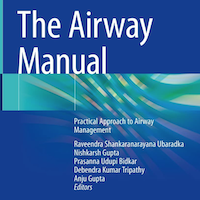
Recommendations for a Standardized Pulmonary Function Report
The American Thoracic Society committee on Proficiency Standards for Pulmonary Function Laboratories has recognized the need for a standardized reporting format for pulmonary function tests. Although prior documents have... read more

Eye Protection in Anaesthesia and Intensive Care
New guidelines on prevention of eye injuries during anaesthesia and intensive care have been developed by the French Society for Anaesthesia and Intensive Care Medicine (SFAR), together with the French Ophthalmology Society... read more

Dying at Home – Our Grandfather’s Great Escape
Our 94-year-old grandfather's last journey was not a glorious affair, an inelegant denouement to a life marked by global travel and migration. Still, to us, as we pushed his wheelchair out of the hospital lobby, it felt like... read more

Hypovitaminosis C and vitamin C deficiency in critically ill patients despite recommended enteral and parenteral intakes
Critically ill patients have low vitamin C concentrations despite receiving standard ICU nutrition. Septic shock patients have significantly depleted vitamin C levels compared with non-septic patients, likely resulting from... read more

Implementation of a Goal-Directed Mechanical Ventilation Order Set Improves Compliance
Implementation of a Goal-Directed Mechanical Ventilation Order Set Driven by Respiratory Therapists Improves Compliance With Best Practices for Mechanical Ventilation. Data regarding best practices for ventilator management... read more

High Morning Cortisol Tied to Long-term Anxiety in Family Members of ICU Patients
A new study published in the journal Critical Care Medicine finds that a biomarker may help identify which family members will be most emotionally impacted by their loved one's ICU stay. In particular, family members who... read more

Alarm Reductions Don’t Improve ICU Response Times
It will take more than a reduction in alarms to address the issue of alarm fatigue in the ICU; a change in the ICU staff culture is needed, suggests new research. A program run at Dr. Kunadu's hospital showed that cutting... read more

New Guidance for Medication Safety in the ICU
Critically ill patients are a population at high risk for more frequent and more severe medication-related events. Critically ill patients receive twice the number of medications that non-critically ill, hospitalized patients... read more
Ethics in the NICU: Principles, Methods, and Application
Dr. Mark Mercurio gives a basic review of some of the fundamental principles and approaches relevant to decision-making in the NICU. Adequate fellowship training in ethics and professionalism is essential so that neonatologists... read more

Reduction in Central Line–Associated Bloodstream Infections Correlated With the Introduction of a Novel Silver-Plated Dressing for Central Venous Catheters
Use of SDs is associated with a significant decrease in CLABSI rates in adult ICU patients compared to CHGIS dressings, with an estimated cost savings of US$4070 to US$39 600 per 1000 catheter days. A total of 3189 patient... read more

Guidelines for Point-of-Care Use of Transesophageal Echocardiography in Cardiac Arrest Resuscitation
In patients with cardiac arrest, transesophageal echocardiography (TEE) may provide greater benefits than transthoracic echocardiography (TTE) for imaging, diagnosis, and prognosis, according to a review paper published in... read more

The Nurses: A Year of Secrets, Drama, and Miracles with the Heroes of the Hospital
Nurses is the compelling story of the year in the life of four nurses, and the drama, unsung heroism, and unique sisterhood of nursing—one of the world's most important professions (nurses save lives every day), and one... read more

Effects of the I-PASS Nursing Handoff Bundle on Communication Quality and Workflow
Implementation of the I-PASS Nursing Handoff Bundle was associated with widespread improvements in the verbal handoff process without a negative impact on nursing workflow. Implementation of I-PASS for nurses may therefore... read more
Why Nursing Burnout is A Priority
Nursing burnout is still seen as a "soft" topic. How do we know that? Well, it is still a dilemma that organizations do not know what to do with. That and it is often bumped from the agenda. Think about it- what comes first?... read more

Mountain Ultra-Marathon Finishers Exhibit Marked Immune Alterations Similar to Those of Severe Trauma Patients
Runners competing in mountain ultra-marathons (MUMs) are known to display features of marked inflammation due to muscle micro-trauma, oxidative stress, gastrointestinal dysfunction, or endotoxin translocation. Furthermore,... read more

Late Mortality After AHRF
Acute hypoxic respiratory failure (AHRF) is associated with significant acute mortality. It is unclear whether later mortality is predominantly driven by pre-existing comorbid disease, the acute inciting event or is the result... read more

Heuristic Thinking in the Emergency Department
This paper explores the use of heuristics among highly-trained physicians diagnosing heart disease in the emergency department, a common task with life-or-death consequences. Using data from a large private-payer claims database,... read more








